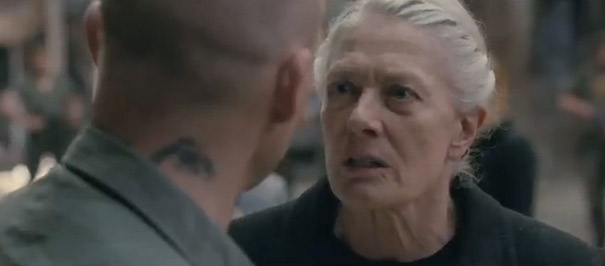David here with another report from the London Film Festival. First up, a Shakespeare adaptation with even more pedigree than usual.

"Anger is my meat. I sup upon myself." So proclaims Volumnia (Vanessa Redgrave) halfway through Ralph Fiennes' directorial debut Coriolanus. In person at the press conference, the raggedly bearded Fiennes' couldn't be more affable, but Caius Martius Coriolanus (Fiennes, following Olivier and Branagh by directing himself in a Shakespearian lead) lives, and perhaps fosters, a world of fearsome aggression. In both the narrative and the extra-filmic reality of the cast, the hierarchy makes itself apparent: as Redgrave powers her way through her titanic final monologue, her terribly veined neck strained upwards as she spits and crows at Fiennes, she burns through Fiennes' schizophrenic celluloid, a scorch mark on a scuffed rug. Redgrave outacts everyone in sight because Shakespearean dialogue is part of her bloodstream, but also because she is so precise in how much of herself she commits to each moment. Redgrave's vibrant poise and direct anger are graciously straightforward without compromising on character depth.
The remainder of Coriolanus cannot be gifted with such lavish praise. With strong echoes of Richard Loncraine's Richard III, Fiennes resets this Roman tragedy into a modern day 'somewhere calling itself Rome' (Fiennes actually shot in Serbia and Montenegro), with swords made guns and so on. The violent shifts in judgement, possibly curtailed by John Logan's pacy adaptation, are incomprehensible in a modern setting, so any building involvement or emotion is frequently stoppered. More crucially, Barry Ackroyd's close, reactive camera is fatally countered by the flat lighting, so what were in Paul Greengrass' films electrifyingly improvised compositions here just look crude and ugly, faces chopped and distorted, settings indistinguishable. Fiennes suffers most from this, perhaps unable to direct himself out of an exaggerated, bug-eyed mode. Still, there is a bold bullishness to his filmmaking that isn't entirely unpromising. (C)
Director Andrew Dosunmu bookended the British premiere of his first fiction feature Restless City by proclaiming that he intended for it to be a look at the "consequences of displacement". Djibril (Alassane Sy) is a Senegalese immigrant Vespa'ing his way around New York City, connected mostly to his headphones until he gets lost in the world of Bekay (Anthony Okungbowa). Bekay is a pimp and loan shark whose influence over Djibril tightens when Trini (Sky Grey) enters the picture. Dosunmu, working with new wunderkind cinematographer Bradford Young (whose work on Pariah Craig praised last week), captures a New York that's open and vibrant but also elusive and dangerous. Djibril's reticent nature makes for a rather distant hero, and the eerie slow-motion interludes set to unlikely music wear with repetition, but Dosunmu's background in photography ensures that this is a striking visual experience. That's particularly true in the rich intimacy the camera keeps with the characters and the use of natural light in the unnervingly still framings of the interiors. (B)
 The Forgiveness of Blood might be a familiar title if you've been following recent developments in Oscar's Foreign Language Film category - it was rejected for being "insufficiently Albanian", due to its American director, Joshua Marston, who cruelly underwent a similar indignity in 2004 with his debut Maria Full of Grace. A shame that AMPAS are so discouraging, really, especially when Marston proves once again his talent with foreign actors. Marston and Andamion Murataj's script has been winning the festival attention, wound tight as it is with agitated conflicts of familial loyalty, and modernity's impatience with cruel traditions. The film also softly captures the restlessness of youth, from the coy flush of romance to the impatient, to selfish rebellion against absent fathers. Though Blood is deliberate, slightly ponderous and ultimately too distant to really pack an emotional wallop, Marston nevertheless paints a bare portrait of these hesitating lives, drawing particularly strong performances from Halilaj and Sindi Lacej as the two eldest, and most upset, children of the affected family. What's more, Marston's citizenship is never a boundary to telling an evocatively specific national story. (B-)
The Forgiveness of Blood might be a familiar title if you've been following recent developments in Oscar's Foreign Language Film category - it was rejected for being "insufficiently Albanian", due to its American director, Joshua Marston, who cruelly underwent a similar indignity in 2004 with his debut Maria Full of Grace. A shame that AMPAS are so discouraging, really, especially when Marston proves once again his talent with foreign actors. Marston and Andamion Murataj's script has been winning the festival attention, wound tight as it is with agitated conflicts of familial loyalty, and modernity's impatience with cruel traditions. The film also softly captures the restlessness of youth, from the coy flush of romance to the impatient, to selfish rebellion against absent fathers. Though Blood is deliberate, slightly ponderous and ultimately too distant to really pack an emotional wallop, Marston nevertheless paints a bare portrait of these hesitating lives, drawing particularly strong performances from Halilaj and Sindi Lacej as the two eldest, and most upset, children of the affected family. What's more, Marston's citizenship is never a boundary to telling an evocatively specific national story. (B-)